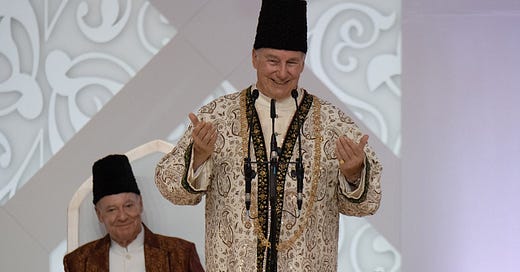The Meaning of "Mawla" in the Ghadir Khumm Sermon
Understanding the Prophet’s Words at Ghadir Khumm
‘Id al-Ghadir Mubarak to all Shi‘i Muslims worldwide. This is the day that Prophet Muhammad⁽ˢ⁾ declared the leadership (wilaya) of Imam ‘Ali at Ghadir Khumm publicly and for the final time during his mission.
The Ghadir Sermon of the Prophet was preceded by numerous other statements attesting to the successorship (wasiyya) and authority (wilaya) of Imam ‘Ali as documented in Sunni sources, as you may read here: Imam Ali Declared the Successor of Prophet Muhammad in Sunni Hadith Literature.
The Ghadir Sermon is extremely well attested in Sunni Muslim hadith and historical scholarship. Using modern historical methods, the historicity of the Ghadir Sermon by the Prophet has been endorsed over the last two decades by various Western scholars. L. Veccia Vaglieri states in The Encyclopaedia of Islam [Volume 2:]
“It is, however, certain that Muḥammad did speak in this place and utter the famous sentence, for the account of this event has been preserved, either in a concise form or in detail.... the ḥadīt̲h̲s are so numerous and so well attested by the different isnāds that it does not seem possible to reject them.”
- L. Veccia Vaglieri, “G̲h̲adīr K̲h̲umm,” in Peri Bearman, T. Bianquis, C. E. Bosworth, E. Van Donzel, and W. P. Heinrichs (eds.), The Encyclopaedia of Islam, Second Edition (Leiden: Brill, 1960), 993-994.
Understanding the Prophet’s Declaration at Ghadir Khumm
The Prophet's Ghadir speech concluded with him saying "Do I not have more authority (awla) over you than your own souls?" In this statement, the Prophet was paraphrasing Holy Qur’an 33:6 - “The Prophet has more authority (awla) with the Believers than their own souls” (al-nabiyyu awla bi-l-muʾminin min anfusikum). Then, the Prophet said “He whose Mawla I am, this ᶜAli is his Mawla” (man kuntu mawlahu fa-hadha ᶜAliyyun mawlahu).
The word ‘mawla’ in the Ghadir Sermon cannot mean ‘friend’ or ‘client’ as some Sunnis claim because the Prophet himself set up the context of his meaning of the word mawla by two clear indicators (qara’in):
1) The Qur’anic verse (33:6) - “the Prophet has more awla with the Believers than their own souls”, which clearly means that the Prophet has more authority over the Believers; this interpretation is found across Sunni tafsir (commentary) including al-Tabari and al-Maturidi (major Sunni Qur’an commentators). For example, al-Tabari glosses 33:6 to mean “He [the Prophet] has more right with the believers than their own souls such that he rules among them by whatever he wills of judgment” (Tafsir al-Tabari). Al-Maturidi says about 33:6: “He [the Prophet] is more worthy to them over themselves in terms of obedience to him, respect for him and glorification, meaning he is more worthy to be glorified, respected and obeyed than others.”
2) The Prophet first refers to himself as the Mawla of the Believers - “he whose Mawla I am (man kuntu mawlahu).” This obviously cannot mean friendship, kinships, or clientship (dependency of a freed slave on a free person) because the Prophet was NOT the friend, kinsman, or client (freed slave dependent) of the Believers. Rather, the Prophet was the supreme leader, teacher, guide, judge, guardian, protector, and overseer of all the Believers as the Qur’an attests in many places. The correct meaning of mawla in the Ghadir Sermon is ‘master, lord, guardian, protector’ - which first describes the Prophet’s rank in relation to the Believers and, subsequently, Imam ‘Ali’s rank over the Believers. The statement, “he whose Mawla I am, this ‘Ali is his Mawla”, places ‘Ali’s authority (wilaya) over the Believers at the same rank as the Prophet’s.
Thus, by declaring Imam ‘Ali as the Mawla of everyone for whom the Prophet was the Mawla, the Prophet has declared Imam ‘Ali as his successor in both religious and political matters.
Note: The typical Sunni response to Ghadir Khumm is to say the Prophet’s speech about Imam ‘Ali was to only defend ‘Ali against certain people’s slanders, after ‘Ali refused to distribute the war booty in the Yemen expedition. This explanation is false for two reasons. First, the Yemen expedition began around December 631, which is over three months before the Prophet’s declaration at Ghadir Khumm. The Sunni sources do record a dispute between Imam ‘Ali and his men regarding war booty, where the Prophet defended ‘Ali; but this event [see Sunni hadith transmitted by Burayda] has nothing to do with Ghadir Khumm and took place elsewhere with just one person present. Second, there is not a single account of the Ghadir Khumm Sermon where the Prophet even mentions Yemen or an issue with war booty.





I very much appreciate it to receive regular posts, especially the timely ones. Very enlightening. This is something I can refer to when I'm having conversation with non Ismaili or non Shia friends,
Thank you. Proud to be an ISMAILI.
Thank you for another great post.